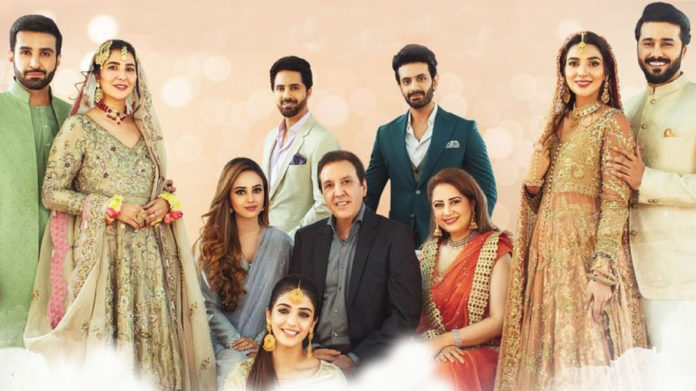When it started off, Angna didn’t strike a good chord with the audience, especially after the Ali Abbas controversy, where his character was seen slapping his wife out of sheer fear of his mother. However, after that one slip, Angna not only picked up its pace, but made us realize that this was a remarkable effort on part of the producers, the director, the writer, and of course, the actors.
Angna: The Story
Angna narrated the story of four sisters belonging to an upper-class family. Until now, we have seen dramas where parents of women are under pressure from society, but here, we had two strong parents in Azhar and Zeba, who would go to any extreme to support their daughters. Moreover, Azhar’s mother, and the grandmother too, were also great women – farsighted, but also very protective.
Through the story of these four daughters, Angna, brought across various subplots that dealt with marriage after being widowed, coming out of a toxic relationship, taking a stand against an abusive marriage, and also how to deal with a person suffering from childhood trauma.
The Tales Of The Daughters
Each daughter portrayed her own story and brought across a sensitive subject, which is hardly dealt with openly in our society. For Abeeha, widowed at a very young age, and suffering from one mishap after another, we loved how she and her family beamed with positivity. We also saw how Abeeha was cherished by her in-laws, even after her husband passed away, and continued to live with them and support them, as their own son would.
For Aiza, thrown into a toxic marriage, where her husband was already married, we saw how supportive her in-laws would be, and how her parents brought her back home and were ready for any decision she wanted to take. Sadly, Aiza’s story was shortlived as she died in an accident following a reconciliation with her husband. However, we did love the fact that Aiza was not pressurized by her parents to accept her husband’s first wife and move back in with him.
Eshal, with her toxic mother-in-law and her inability to bear children, found a supportive husband, who went to extremes for her. Yes, Eshal’s husband slapped her once out of sheer fear of his mother, but the abuse stopped there and then. Zain gradually started to stand up to his mother and favoured his wife over anything else. He tried to create a balance between his mother and wife. However, the mother was toxic and he found it best to move out, rather than being affected. This subplot dealt with childhood trauma and therapy very well, and addressed issues which have been neglected thus far.
Last, but not the least, we had Nayyab who took a stand for herself and extracted herself out of a toxic marriage where she was being used for her money. We loved how Nayyab stood strong and did not cave in under any pressure, did not accept any apology, and continued to own her yet-to-be born child herself.
However, in all of thus, audiences felt that certain loose ends were left behind, and a tighter closure could have been provided to the storylines of some of the sisters.
Angna: The Treatment
Angna brought forth the story of four powerful women with their extremely supportive parents. Not once did the drama show the family pressurizing their daughters for anything at all – a rarity in times like today. Maybe this portrayal is a little far from the truth, but something we all ought to see in times like today. We were glad that the channel did not focus on the negativity, but more on spreading positivity through their drama.
The Team
Direction by Tahseen Khan and Saqib Zafar was on point – nothing more, nothing less. Angna didn’t have any dragged moments and each and every plot/arc was handled and wound up with perfect timing. Kudos to the writer, Samina Ejaz for that as well.
Since Angna had an ensemble cast, it is hard to name each and every actor, but Ali Abbas deserves applause for his portrayal as Zain, as does Rubina Ashraf as Saira. Negative characters, especially those inducing trauma and those being traumatised are hard to play onscreen, and both Ali Abbas and Rubina Ashraf did a remarkable job. Laiba Khan as Nayyab looked absolutely beautiful. Rabab Hashim, Areeba Habib, Atiqa Odho, Gul E Rana, Kanwal Khan – each and every actor was aptly cast and delivered outstanding performances.
The Verdict
Angna was the type of drama to create a hype like major television serials. However, this daily soap wasn’t your run of the mill story and brought about a new, and refreshing change on our screens. Kudos to the makers for that.




